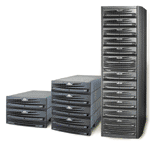The Dell-EMC Squeeze
"We purchased the array through Dell for their support of EMC products," said Mark Craft, systems administrator at Dewberry and Davis. "So far, we haven't had any complaints."


But such a deal represents a big source of complaints among EMC solution providers. Many say the Hopkinton, Mass., storage vendor's Clariion reseller pact with Dell,now a year old,is squeezing their business because the direct computer seller wields a pricing advantage. Some EMC channel partners, in fact, say that Dell hardware in the data center almost ensures a lost sales opportunity for them, and others are concerned that Dell, Round Rock, Texas, could gobble up other segments of the EMC channel.
Their dismay comes with good reason, since Dell has become EMC's biggest storage reseller. EMC CEO Joe Tucci said at a recent conference that one-third of the vendor's Clariion revenue comes via Dell, with solution provider and direct sales also each accounting for one-third of the product line's revenue. The Dell business, however, is the fastest growing segment of the three, Tucci said.
The Dell-EMC alliance particularly has become a thorn in the side of storage solution providers in the enterprise Windows space. For example, Pat Edwards, vice president of sales at Alliance Technology Group, a Hanover, Md.-based solution provider, bristles when people call Dell a reseller of EMC products.
"We're not in the same category with Dell," Edwards said. "EMC gets away with [selling around solution providers by saying that they don't sell direct. They sell to a direct manufacturer like Dell and wash their hands of it."

\
Pat Edwards, vice president of sales at Alliance Technology Group, says it's tough to sell EMC storage to clients with Dell servers.
For storage-only solution providers, selling to a customer that has Dell servers in place is tough, Edwards noted. "If I want to compete there, I have to sell Hewlett-Packard, IBM or Sun servers. But I don't lead with servers," he said. "I will provide servers as a bundle with storage if customers need it. But it's not our business."
If a solution provider enters a customer site and sees Dell products on the floor, it's assumed that the customer shops only for the best price, Edwards added. "Our salesperson will ask if the customer is talking to other vendors. If they say no, we know they're lying," he said.
The Dell relationship is one of the few black marks on EMC's otherwise channel-friendly record, the storage vendor's partners say. Yet Gregg Ambulos, vice president of global channels at EMC, said there's no reason for solution providers to compete with Dell head-to-head on Clariion arrays.
Most of EMC's Dell business should come from the low-cost Windows NT market with EMC's new CX200 entry-level array, while solution providers can serve customers with the midrange CX400 and enterprise-class CX600 arrays, Ambulos said. What's more, solution providers' ability to offer customers complete solutions separates them from low-cost providers like Dell, he said.
"If a solution provider wants to compete head-on with Dell on hardware price, nine times out of 10 Dell will win," Ambulos said. "But if they target solutions, nine of 10 times the VAR will win."
While Dell receives better pricing from EMC than solution providers do, the arrangement is no different than the volume pricing EMC offers its largest partners, Ambulos said, adding that he can't recall a single solution provider that has left EMC because of its Dell relationship.
"If this was having a dramatic impact on the market, we would have a lot of partners question the relationship," he said. "Dell is a key partner of ours, but so are other channel partners."

\
'If a solution provider wants to compete head-on with Dell on hardware price, nine times out of 10 Dell will win. But if they target solutions, nine of 10 times the VAR will win.' -- Gregg Ambulos, EMC
J. Edward McCann, regional manager at Continental Resources, a Bedford, Mass.-based solution provider, said his company isn't very worried about competition from Dell right now. "Dell has done a real good job with its pricing. Once a customer has Dell servers, storage sales are tough. But if we are talking about a large solution, we can beat Dell," he said.
However, as Dell grows the market share for its EMC arrays in the Windows space, there's nothing to prevent it from entering the Unix space, said McCann, whose company is a Sun Microsystems partner.
"If Dell comes in from the NT side to my Unix side and offers service contracts that cost a third of mine, it will hurt the channel. If there is a large enough price delta, common sense says it will hurt us," he said.
And that scenario stands as a real possibility, if things go according to Dell's plans. When EMC introduced its CX600 array in August, Dell said it would use the array to enter the heterogeneous Unix/NT enterprise space and target Unix-only shops for the first time with its commodity-based pricing model.
But since then, Dell has relied on services and its ability to target key markets to ensure that it doesn't compete on price alone, said Terry Klein, vice president of the Advanced Systems Group for Dell Americas. Dell, which sells the Clariion arrays under the Dell-EMC name, is rarely the low-cost leader, Klein said. About 80 percent of the installation and product-readiness services related to Dell servers and Dell-EMC arrays are done by Dell staff, with help from EMC personnel when needed, he said.

\
EMC expects most of its Dell business to come from its new Clariion CX200 entry-level array (l.), with solution providers serving customers using the midrange CX400 (center) and enterprise-class CX600 (r.) arrays.
"Because we mandate these services, we find that [with the actual end-user sales price for the entire bundled configuration, we are rarely the low-cost Clariion provider to an end user," Klein said.
"We may have really aggressive hardware rates, but we find that very few other [EMC channel partners are mandating three years [of warranty or their own installation and/or minimal set of product readiness," he said. "Most of them have one year of service-type of warranty agreements. It's something that we battle with our sales organization about because that's not a typical Dell proposition. We're used to being low-cost, and we end up having to sell more on the value of understanding how this space works."
Because of such services, Dell ends up with a higher price than its competitors,including solution providers,in about eight out of 10 cases, according to Klein. However, about 95 percent of storage sales have gone into Dell server environments, he added.
"There are very few cases where we're going to sell the EMC product where we don't already have the servers," Klein said. "[These customers value our knowledge of Windows. They value our knowledge of the Linux environment. And they value us doing complete sets of server-storage consolidation. If we don't have that element with the customer, it doesn't matter if we're the low-cost provider or the high-cost provider. They won't buy it from us."
The frequency with which Dell competes against solution providers depends on the customer type, according to Klein. For instance, in the Fortune 2000 space, it's rare for Dell to go up against EMC channel partners, but in the government space,where Dell's server market share tops 50 percent,competition depends on which integrator owns a particular government contract, he said.
Similarly, while Dell pretty much owns the state and local government market and the education space either directly or via its relationship with EDS, it has trouble against EMC partners in the health-care arena, Klein said.
Indeed, if EMC solution providers leverage the Dell-EMC relationship, it can mean more business for them, said Bill Taylor, director of EMC's global channel development group.
"I can guarantee you that a lot of our partners are doing well with the Clariion business because of all the Dell hype," Taylor said. "It's a brand-name recognition game."
Some solution providers say they're finding that Dell's sales of Clariion arrays can even benefit their business. "We can get some services from Dell because of customer needs," said Chris Swahn, national president of sales at Amherst Corporate Computer Sales and Solutions, Merrimack, N.H. "Our technology, integration and delivery capabilities offer value to our customers. We do a lot of imaging, ghosting and loads on Dell servers."
For Amherst, the Dell-EMC alliance is a minimal factor in the midrange and enterprise spaces, but that could change, said Swahn. "Even in the midrange shops that have Dell relationships, we're not seeing a lot of action with Dell storage. Of course, maybe the other shoe will fall, and [Dell will come in later," he said.
A former EMC partner, Amherst is mulling the possibility of reuniting with the vendor now that its channel-unfriendly past is fading away, according to Swahn.
"EMC wants to get into the SMB market. [Now they're looking at how to do it," he said. "They already have the best technology. So we're evaluating them again, based not on technology but on their channel capabilities."
Alliance Technology Group also had previously dropped EMC's Clariion line, but the solution provider recently decided to restart its Clariion relationship with the vendor, Edwards said.
And those solution providers likely will see more competition. Looking ahead, Dell and EMC executives expect their relationship to expand.
In late October, the vendors announced that EMC had licensed Dell to manufacture the entry-level CX200, slated to ship early this month. EMC's Tucci also said he isn't ruling out the possibility that Dell could eventually make Clariion storage arrays for the rest of EMC's channel,a move that some industry observers say would put EMC partners in the difficult position of purchasing EMC products from its strongest competitor.
"We are not closing any doors," Tucci said. "We continually [review it, like any relationship. In any relationship, you plant the seeds, grow and learn from each other. Right now, far and away, the volume seller by Dell will be the CX200. And they are manufacturing it to control their own destiny."
The fact that future EMC arrays could be manufactured in conjunction with Dell doesn't concern Kevin Reith, manager of strategic technology at Info Systems, a Wilmington, Del.-based solution provider.
"Who makes it is not important," Reith said. "I believe in the virtual organization: Do what you do best, and let others do the rest. So it doesn't bother me. What's more important is how they support and market the products."
STEVEN BURKE contributed to this story.